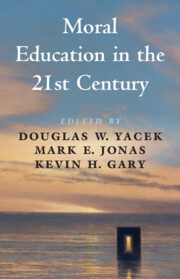Book contents
- Moral Education in the 21st Century
- Moral Education in the 21st Century
- Copyright page
- Contents
- Contributors
- Acknowledgments
- Chapter 1 Why Does Moral Education Matter in the 21st Century?
- Part I Historical Insights for Contemporary Moral Education
- Part II New Approaches to Moral Education
- Part III Responses to Contemporary Moral Problems
- Chapter 13 Moral Education in and for Virtual Spaces
- Chapter 14 The Consumerist Threat to Education and Democracy
- Chapter 15 Moral Education and Deep Disagreement
- Chapter 16 A Character-Based Perspective on Sexual Ethics and Sex Education
- Chapter 17 The Moral Eclipse of Boredom
- Index
- References
Chapter 14 - The Consumerist Threat to Education and Democracy
from Part III - Responses to Contemporary Moral Problems
Published online by Cambridge University Press: 01 June 2023
- Moral Education in the 21st Century
- Moral Education in the 21st Century
- Copyright page
- Contents
- Contributors
- Acknowledgments
- Chapter 1 Why Does Moral Education Matter in the 21st Century?
- Part I Historical Insights for Contemporary Moral Education
- Part II New Approaches to Moral Education
- Part III Responses to Contemporary Moral Problems
- Chapter 13 Moral Education in and for Virtual Spaces
- Chapter 14 The Consumerist Threat to Education and Democracy
- Chapter 15 Moral Education and Deep Disagreement
- Chapter 16 A Character-Based Perspective on Sexual Ethics and Sex Education
- Chapter 17 The Moral Eclipse of Boredom
- Index
- References
Summary
In this chapter I identify several important questions consumerism raises regarding moral education, and conclude by considering how moral education can address consumerism in several important ways. In doing so I explore the extent to which the moral and political aims of education intersect, noting consumerism’s moral implications for democracy, citizenship, and public life in general. Not only are advertising and marketing the “new educator” but consumerism is also undermining the more conventional or noncommercial kinds of education. Moral education always takes place in a social and political context, which today is increasingly dominated by consumerism. I argue that schools, which are foundational in the formation of the moral and civic identities of future democratic citizens, are still a crucial locus of resistance against the forces of consumerism. Given the moral implications of the dominance of consumerism in the contemporary world, there is an urgent need to address consumerism in modern moral education.
- Type
- Chapter
- Information
- Moral Education in the 21st Century , pp. 260 - 280Publisher: Cambridge University PressPrint publication year: 2023

